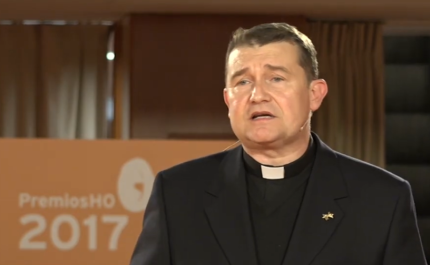Custodio Ballester is a Catholic priest in Barcelona. He makes no secret of his critical view of Islam, and like several Muslims, many political progressives have over the years sought to silence him. In 2017, a lawsuit was filed against him based on statements he made in 2016 and 2017.
In an article titled “The Necessary Dialogue with Islam,” Barcelona’s Archbishop Juan José Omella praised Pope Francis for inviting Grand Imam Ahmed el-Tayeb to the Vatican in May 2016. This historic meeting, Omella wrote, resumed the “necessary dialogue with Islam” that had been interrupted after Pope Benedict’s reaction to the terrorist attack against the Coptic community on New Year’s Day 2011, as well as his critical address on Islam in Regensburg in 2006. The attack in question occurred outside the cathedral in Alexandria following the New Year’s Mass, when a car bomb killed 21 and injured 70 worshippers. Pope Benedict XVI condemned the attack and emphasized the local authorities’ responsibility to protect Christians. The Grand Imam of Al-Azhar University in Cairo and the spiritual leader of Sunni Islam, Ahmed el-Tayeb, viewed the Pope’s words as an unacceptable interference.
Father Custodio Ballester challenged his archbishop’s views in an article on 29 December 2016 titled “The Impossible Dialogue with Islam.” There he wrote:
“Islam does not allow dialogue. One is either a believer or an infidel, and the latter must be suppressed one way or another. (…) It is one thing not to despise people for what they believe or think, and not to persecute them for it — and quite another to have to conceal our faith so that it will not clash with a progressive dogma and the ideology that has declared war on our religion. Even worse, they have declared war on people themselves. In countries where Muslims hold power, Christians are brutally persecuted and killed — what kind of dialogue is that?”
In 2017, Ballester appeared on the talk show La Ratonera on Alerta Digital TV, hosted by journalist José Robles. During the broadcast, Ballester stated that “radical Islam intends to destroy Europe and thereby annihilate the West.”
The Lawsuit
The organisation Muslims Against Islamophobia is led by convert Ibrahim Miguel Ángel Pérez and receives public funding from Barcelona City Council and the regional government of Catalonia. The organisation has publicly praised the Taliban regime.
Following Ballester’s 2017 TV appearance, the organisation filed a complaint with the Public Prosecutor’s Office in Málaga (as Alerta Digital TV is based there), under the direction of prosecutor María Teresa Verdugo. In addition to the TV appearance, Verdugo chose to include Ballester’s 2016 article in the case. In 2020, she declared that Ballester had committed a hate crime and sought a three-year prison sentence and a fine of €3,000.
Ballester responded:
“The problem is that you hate-crime prosecutors encourage complaints from these radical organisations and have created a climate of fear in which such people thrive. The hate-crime prosecutor’s office has always been extremely selective: maximum punishment for those who criticise Islam — forgiveness and indulgence for offences against Christianity.”
According to Ballester, the purpose of the lawsuit was to send a warning to all Christians: anyone who criticises Islam will be punished.
Who Is María Teresa Verdugo?
María Teresa Verdugo serves as a prosecutor at the Provincial Court of Málaga, where since 2011 she has been the delegated prosecutor for hate crimes and discrimination. She is therefore one of Spain’s most experienced prosecutors in this field.
Between 2014 and 2016, she represented Spain in the EU working group on encouraging the reporting of hate crimes and improving statistical data. In 2019, she served as a member of the UN Committee on the Elimination of Racial Discrimination. In May 2025, the Spanish government appointed her as chair of the Independent Authority for Equal Treatment and Non-Discrimination under the Ministry of Equality.
Legal Framework
Ballester was charged under Article 510 of the Spanish Penal Code, which criminalises publicly inciting, producing, or distributing material that promotes hatred, hostility, discrimination, or violence against individuals or groups on the basis of religion, race, ethnicity, nationality, sex, sexual orientation, gender identity, illness, or disability. The law was introduced in 1995 and expanded in 2015 to include online offences.
The penalty ranges from one to four years in prison, in addition to fines or suspension from professional activity.
Ballester has criticised the law as a blank cheque:
“Not even the prosecutors themselves know how to define ‘hate’. In each case, they fabricate a crime based on who supposedly committed it — and the crime always goes one way. They only prosecute Christians, never Muslims.”
Reactions to the Lawsuit
The Archdiocese maintained silence throughout the proceedings, stating that it “would not comment on the case.” Sources told El Debate that Archbishop Juan José Omella considered it appropriate to “maintain discreet silence.” He did, however, call Ballester privately to express his solidarity.
Public support for Ballester was considerable. The Christian Lawyers Foundation (Abogados Cristianos) collected more than 29,300 signatures calling for his acquittal. When the trial opened in Málaga on 1 October, several supporters gathered outside the courthouse carrying posters in his defence.
Ballester also received backing from several organisations, including the Observatory for Religious Freedom, whose president María García expressed alarm that Ballester might go to prison “solely for exercising his freedom of speech and religion by warning against the threat of radical jihadism.” She added:
“Defending religious freedom also means protecting the rights of those, like Father Custodio, who speak out about realities that have already claimed lives in our country and across Europe.”
García referred to the Islamist attack committed by Yassine Kanjaa on 25 January 2023 at two churches in the southern Spanish city of Algeciras, where a sacristan was killed and a priest and three parishioners injured. She posed the question:
“Is the crime committed by those who denounce violence, or by those who perpetrate it?”
Acquittal
On 15 October 2025, the verdict was delivered: Custodio Ballester was acquitted.
The initial hearing had taken place on 1 October 2025 at the Provincial Court of Málaga. Before the verdict, Ballester stated that if he were sentenced to prison, he would appeal to the European Court of Human Rights.
After eight years of proceedings, the court ruled in his favour. The judgment stated that Ballester’s remarks could be considered “unfortunate, lacking nuance, rooted in irreconcilable religious or ideological stereotypes, or tending toward unfair and arbitrary generalisations, but this does not mean that they constitute a crime of incitement to hatred.” The court emphasised that freedom of expression also includes the right to criticise.
Ballester expressed relief after the long ordeal:
“This verdict is more than a personal victory. It will set a precedent and protect all those who dare to speak freely. It is a bulwark against ideological censorship disguised as justice. For if a priest cannot warn of the dangers he sees facing his community, who can?”
He added:
“I will continue to speak, to preach, and to reject what I see as unjust. For if one remains silent when one should speak, one betrays the truth. And as a priest, it is my duty to enlighten — even if it makes some people uncomfortable.”



